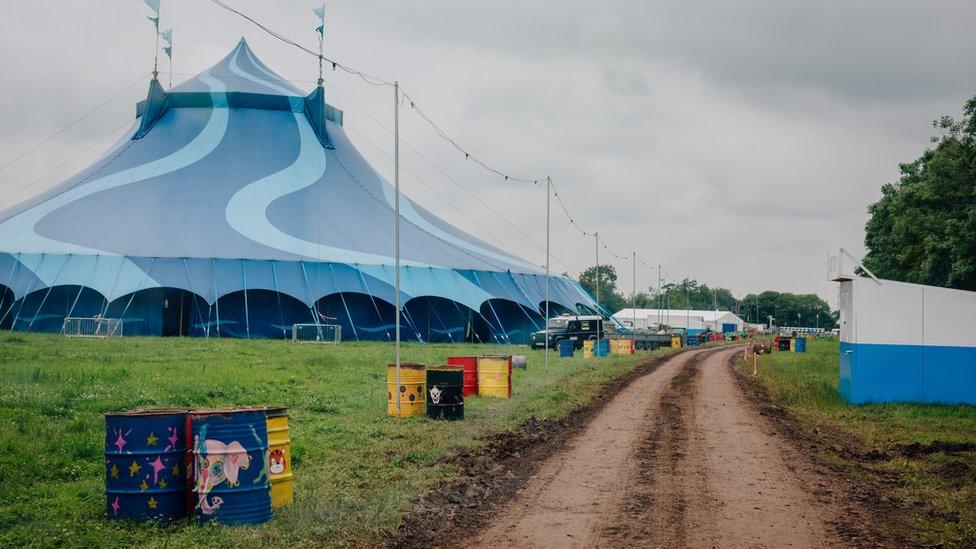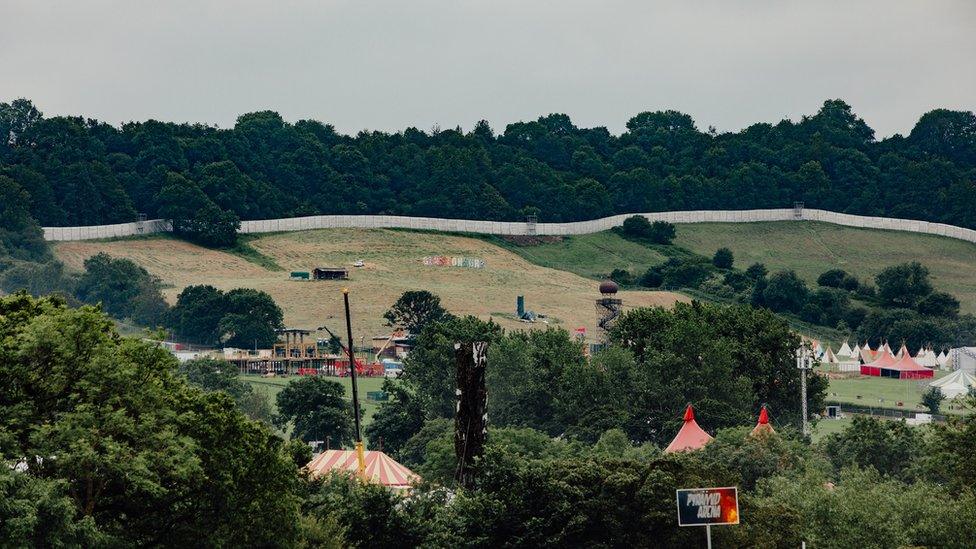Why Glastonbury has £10m in the bank
- Published
Emily Eavis tells the BBC the organisers try not to plan too far into the future
The fields around Worthy Farm in Somerset, would kindle a warm glow in the heart of Donald Trump. An eight-mile long, 20-foot high fence runs round the farm and the 12 neighbouring properties, encasing Britain's biggest music festival - Glastonbury, of course.
The festival might even be more secure than Mr Trump's planned border wall between the US and Mexico.
There are in fact two fences. A slightly shorter one sits in the shadow of the large barrier with enough room between them to drive an emergency vehicle.
It's designed to deter those who want to watch the big name acts without paying the £245 ticket price. Some still try. "When they take it down they find the odd body part left behind," says a local taxi driver with a grim smile.
The wall is testament to Glastonbury's pulling power, and commercial success. When the 135,000 tickets for this year's event, which starts on Wednesday, went on sale, they disappeared in 36 minutes. Two million people pre-registered to have a shot at buying one.

Festivals are enjoying a moment in the sun with popularity and numbers of events soaring
Glastonbury sits at the top of the UK festivals tree - a tree whose lower branches have sprouted rapidly in recent years.
According to UK Music, the music industry trade body, four million people attended a festival in 2017, the most recent year for which it holds figures. Five years before, it was only three million. The Association of Independent Festivals, which speaks for those events not organised by the large music industry players, says festival goers spent nearly £400 per head on average at each event.
Despite that, festival promoting remains a risky business. Backers are forever playing off the value of spending heavily to secure a big act and boost ticket sales, and the pressing need to control costs.
Some are concerned about the proliferation of rival events. A look at the UK Festivals website reveals ten or more events every summer weekend, catering to every possible musical taste. And independent promoters complain that too much power has been concentrated in the hands of a few companies, in particular Live Nation, the American entertainment group that runs about one-quarter of the large (more than 5,000 attendance) events in the UK.
The other wild card is the weather. The forecast is good for this year's Glastonbury, but it has endured epic washouts and mud baths. The unpredictability of the business explains why the company behind the party, Glastonbury Festival Events, maintains a cash pile of more than £10m.

This year Glastonbury is ready to welcome festival-goers again after a hiatus last year
The buffer is revealed in its most recent accounts. In the year to the end of March 2018, it made a post-tax profit of £1.43m, had cash reserves of £10.6m and made charitable contributions of £2.1m.
Emily Eavis, the event's co-organiser and daughter of founder Michael Eavis , said the reserves were about protecting the event against unforeseen events.
"Contingency is really important to us. The elements are so unpredictable. We are completely at the mercy of the elements," Ms Eavis said in an interview with the Today programme.
"We have to sell out to break even, because the event costs so much to put on - about £40m. Our other goal is to be able to give the charities we support about £2m a year. Glastonbury employs about 50 people full time."

But Ms Eavis said they did not take success for granted.
"It is definitely related to fashion and trends. People like going to festivals at the moment; we are in an up period.
"But the thing about Glastonbury is that it has never had a very long term plan - we project five years into the future, but not beyond that. It takes away from the spirit of the event to be planning too far ahead."
Ms Eavis said the company had turned down most requests to licence the Glastonbury name for other events. "You won't be seeing a Glastonbury America," she said.
While Glastonbury is enjoying a strong return - last year there was no event - the festival industry has had some high-profile failures. The most notorious was the 2017 Fyre Festival in the Bahamas, promoted by businessman Billy McFarland and rapper Ja Rule. It was meant to be a luxury event with top name acts, but turned out a complete flop, with those attending being offered stale cheese slices and half-built tents.

Alex Trenchard ran into financial problems when his Standon Calling festival took off
Even success can create its own problems. Alex Trenchard, founder of the Standon Calling festival in Hertfordshire, was sent to jail for fraud after trying to cover some costs on his employer's company credit card in the early years of the event.
"I was in my early twenties, the event had grown quickly and I had a call from the security company a week in advance saying if I didn't pay they wouldn't be showing up. I got into a deep hole and didn't tell anyone about it," he said.
Since then Standon Calling has prospered. Mr Trenchard said the key to a successful festival was the ability to control costs. It has pioneered the use of Oyster-card style payment cards, which let festival-goers pay for their food and drink quickly. It also allows Mr Trenchard to see exactly where the money is going and how much third-party caterers and drinks suppliers are taking.
"It is like any medium-sized business," he said. "But with festivals, all that business happens over one weekend."
- Published23 June 2019

- Published13 June 2019
